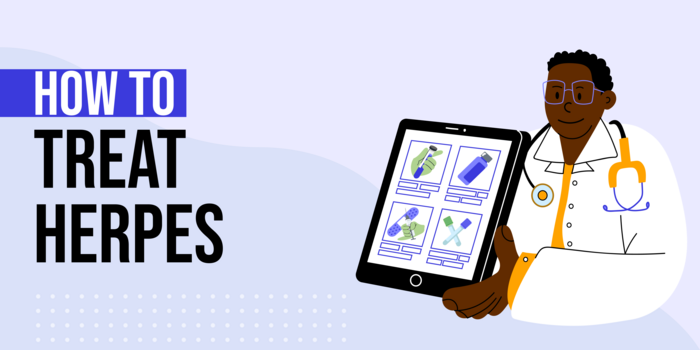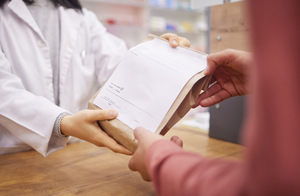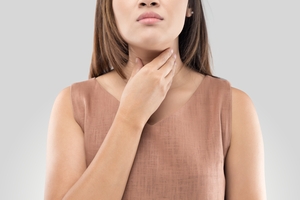Key points
- Genital herpes, caused by the Herpes Simplex Virus, is a common STD with no cure but manageable symptoms.
- The virus is transmitted through skin-to-skin contact, including sexual activity and kissing.
- Home remedies for genital herpes include cold compresses, Vaseline, essential oils, balanced diet, air drying, loose clothing, and witch hazel.
- Regular STD testing, condom use, and open communication with partners can help prevent the spread of genital herpes.
- Prevention methods include safe sex practices, open communication about sexual history, and regular STD testing.

Genital herpes is an STD that is caused by the Herpes Simplex Virus (HSV). A version of this virus is also responsible for “cold sores” which are herpes lesions on the lips. Genital herpes is very common—around 1 in every 6 people between the ages of 14 and 29 years of age have genital herpes according to Johns Hopkins University.
HSV spreads by skin-to-skin contact with an infected person, according to the CDC. This includes having vaginal or anal sex with someone who has genital herpes, as well as kissing or receiving oral sex from someone with cold sores (oral herpes).
There is no cure for genital herpes, but there are many home remedies and medications that can ease symptoms and help reduce the risk of spreading the virus to another person.
Symptoms of Genital Herpes
The symptoms of genital herpes, according to the Mayo Clinic, include:
- Pain or itching around the genitals or anus
- Small bumps or blisters around the genitals or anus
- Painful sores or ulcers that form when the blisters rupture
- Oozing or bleeding from blisters
- Scabs that form as the sores and ulcers heal
- Pain or difficulty with urination
- Unusual discharge from the vagina or penis
- Bumps, sores, and blisters on the buttocks and upper or inner thighs
Home Remedies for Genital Herpes
1. Apply a Cold Compress
A cold compress can help reduce the pain and swelling caused by genital herpes, according to several sources including Healthline. They recommend that you apply an ice pack to the affected area every few hours, as needed. You can also use a cold, damp cloth or sit in a lukewarm bathtub if you don’t have an ice pack.
2. Use Vaseline
Applying a thin layer of petroleum jelly such as Vaseline to the herpes lesions can provide a barrier from irritation caused by friction or urination, according to Healthline. They recommend that you use a clean cotton swab or clean fingers to apply the Vaseline and wash your hands thoroughly afterward.
3. Use Essential Oils (Especially Tea Tree Oil)
Several essential oils may be beneficial for easing symptoms during a herpes outbreak, according to Healthline. Among their list of essential oils with potential antiviral benefits are:
- Thyme
- Lavender
- Eucalyptus
- Ginger
- Mexican oregano
- Licorice root
- Echinacea
- Neem
Topping the list is tea tree oil, which they note has the most evidence for preventing future outbreaks. They note that you should dilute any essential oil with a carrier oil before using.
4. Eat a Well-Balanced Diet
Eating a well-balanced diet can help support your recovery from a herpes outbreak by making sure you get all the vitamins you need for a healthy immune system, according to Healthline. They recommend eating antioxidant-rich foods like cauliflower, spinach, kale, and tomatoes—as well as foods high in omega-3 fatty acids (like salmon, flaxseed, and chia seeds), and foods high in vitamin C (like mango and papaya).
5. Allow Yourself to Air Dry
After bathing, using a towel to dry may be irritating, according to Healthline. They recommend that you allow yourself to air dry or use a hair dryer set to a cool setting to dry the affected areas.
6. Take Over-the-Counter Pain Relievers
Over-the-counter pain relievers such as ibuprofen or acetaminophen can help reduce the pain caused by genital herpes, according to the Mayo Clinic.
7. Wear Loose-Fitting Clothes
Wearing loose-fitting clothes can help prevent further irritation by reducing the amount of friction on the affected areas, according to Healthline. They recommend that you avoid tight-fitting clothing, especially tight leggings, underwear, or jeans.
8. Use Witch Hazel
Healthline notes that witch hazel has proven antiviral properties that may be able to ease your herpes symptoms and clear up your outbreak. They recommend that you dilute the witch hazel in water or a carrier oil if you have sensitive skin.
When to see a Doctor for Genital Herpes
Genital herpes is a viral infection that usually needs treatment to manage. Health Direct notes that if you notice any change to how the skin of your genital skin looks or feels you should see your doctor.
Additionally, the CDC recommends that you get tested for herpes and other STDs if you have symptoms of an STD or are in a high-risk group for getting one.
Health Direct also recommends that you see a doctor if you have ever had a diagnosis of genital herpes and:
- Are having pain or difficulty urinating
- You have severe pain during a herpes outbreak
- You have frequent herpes outbreaks (flare-ups)
- You don't see improvement with antiviral medicine
Preventing genital herpes
Because genital herpes is a painful virus that has no cure, it is important to take steps to prevent getting exposed to it. The surest way to prevent a genital herpes infection is to not have sex, or have only monogamous sex, according to the CDC.
However, there are other ways you can reduce your risk:
- Use condoms or dental dams every time you engage in sexual activity
- Have open and honest communication with all your sexual partners about their sexual history and recent STD testing
It is important to note that washing or douching is not sufficient in preventing genital herpes, according to the CDC. Since many cases of genital herpes are asymptomatic, the CDC recommends that you get tested for STDs regularly if you are sexually active.
Breakdown of How to Treat Herpes
Genital herpes is a contagious viral infection, caused by the Herpes Simplex Virus. It is one of the most common STDs in the U.S. according to the CDC. You can take steps to prevent contracting it by always using condoms and dental dams when you engage in sexual acts with a partner.
If you have symptoms of herpes, you can try home remedies alongside antiviral medication to ease your symptoms and promote recovery. Some home remedies include:
- Applying a cold compress
- Using Vaseline as a skin barrier
- Eating a well-balanced diet
- Using diluted tea tree oil
- Allowing yourself to air-dry
- Avoid wearing tight clothing
- Clean with witch hazel
FAQs
What is Genital Herpes and how is it transmitted?
Genital herpes is a sexually transmitted disease caused by the Herpes Simplex Virus. It is transmitted through skin-to-skin contact, including sexual activity and kissing.
Can genital herpes be cured?
No, there is currently no cure for genital herpes. However, its symptoms can be managed with medications and home remedies.
What are some home remedies for managing genital herpes symptoms?
Home remedies include applying a cold compress, using Vaseline, using essential oils, eating a well-balanced diet, air drying after bathing, wearing loose-fitting clothes, and using witch hazel.
How can the spread of genital herpes be prevented?
The spread of genital herpes can be prevented by regular STD testing, using condoms or dental dams during sexual activity, and having open communication about sexual history and STD testing with partners.
When should I see a doctor for genital herpes?
You should see a doctor if you notice any changes in your genital skin, have severe pain during a herpes outbreak, have frequent outbreaks, or if your symptoms do not improve with antiviral medicine.
What should I do if my symptoms persist or worsen?
If your symptoms persist or worsen, or if you're in a high-risk group for STDs, it's important to see a doctor.
Is genital herpes a contagious infection?
Yes, genital herpes is a contagious viral infection. However, it can be managed with a combination of home remedies and antiviral medication.
How common is genital herpes?
Genital herpes is quite common, affecting around 1 in 6 people aged 14-29.









